|
|
|
Sort Order |
|
|
|
Items / Page
|
|
|
|
|
|
|
| Srl | Item |
| 1 |
ID:
096583
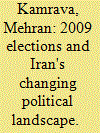

|
|
|
|
|
| Publication |
2010.
|
| Summary/Abstract |
Iran's June 2009 elections set into motion four processes that are central to the operations of the Islamic Republic regime. They include: the growing gap between large sections of Iranian society from the Islamic Republican state; the steady militarization of the political system; the unprecedented degree to which the Supreme Leader has become an active partisan in the increasingly bitter political infighting among regime insiders, and-most significantly-the violent disruption of an emerging set of "rules of the game," that previously served as a safety check against excessive factional infighting. This last consequence of the election and its aftermath is likely to leave its most enduring imprint on the State. Specifically, the elections have taken Iran from manageable factionalism to the brink of complete political paralysis. As such, given the untenability of the State's present predicament, far-reaching changes are almost certain to come.
|
|
|
|
|
|
|
|
|
|
|
|
|
|
|
|
| 2 |
ID:
110161
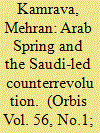

|
|
|
|
|
| Publication |
2012.
|
| Summary/Abstract |
The author contends that the Arab Spring has provided an opening for the Gulf Cooperation Council as a group and for Saudi Arabia as a long-time aspiring leader of the Arab world to try to expand their regional influence and global profile. An already weakened Arab state system, he argues, has been once again weakened by the sweeping wave of rebellion.
With its final chapter yet to be written, the Arab Spring of 2011 is likely to go down in history as a season of profound political changes that swept across the domestic politics of the Arab world. Even at this preliminary stage, that much is clear. What remains unclear, however, is how political change sweeping across the Middle East and North Africa is likely to alter the international relations of the Arab world in general and, in particular, the larger regional position and specific policy preferences of the Gulf Cooperation Council (GCC). Important considerations include the GCC's posture and profile vis-à-vis the Arab Spring, its collective reaction to the region-wide movements for political change, and its delicate relationship with its two troubled neighbors to the north, namely Iran and Iraq.
While the Arab Spring is unlikely to result in meaningful changes in Iran and Iraq's relationships with the GCC, it has fostered two discernible trends in the larger Arab world. First, Saudi Arabia has sought to reassert its position of prominence and leadership within the GCC. In fact, the kingdom has positioned itself as the chief architect of a counterrevolution to contain, and perhaps to even reverse, the Arab Spring as much as possible. Second, and an outgrowth of the first development, is the GCC's attempt to solidify its identity and mandate through the inclusion of additional Sunni monarchies-Morocco and Jordan-as a counterbalance, if not a substitute, to the Arab League.
|
|
|
|
|
|
|
|
|
|
|
|
|
|
|
|
| 3 |
ID:
176570
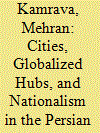

|
|
|
|
|
| Summary/Abstract |
This article examines the three major cities of the Persian Gulf region—Doha, Abu Dhabi, and Dubai. At the regional level, all three cities have become transportation hubs, and Doha and Abu Dhabi have become educational and cultural centers. At the global level, however, only Dubai has succeeded in becoming a key node in international networks of finance, commerce, services, telecommunications, logistics, and transportation. The others' aspirations to become global cities are undermined by continued reliance on oil and gas revenues. On balance, while these cities are comparatively successful regional hubs, their long-term position as global cities is far from certain.
|
|
|
|
|
|
|
|
|
|
|
|
|
|
|
|
| 4 |
ID:
078063


|
|
|
| 5 |
ID:
110342


|
|
|
|
|
| Publication |
2011.
|
| Summary/Abstract |
Uniquely for a country its size, Qatar has emerged as one of the world's most proactive mediators in recent years. Motivated by a combination of international prestige and survival strategies, the country has sought to position itself as a neutral peacemaker in many of the international and intra-national conflicts brewing across the Middle East region. In three of the most notable cases in which it has involved itself - Lebanon, Sudan, and Yemen - Qatar has proven itself to be a capable mediator in reducing tensions but not, crucially, in resolving conflicts. Qatar's successes have been facilitated by a combination of its perceived neutrality by the disputants, the vast financial resources at its disposal to host mediation talks and offer financial incentives for peace, and the personal commitment and involvement of the state's top leaders. These successes, however, are often checked by limited capabilities to affect long-term changes to the preferences of the disputants through power projection abilities, in-depth administrative and on-the-ground resources, and apparent underestimations of the complexities of the deep-rooted conflicts at hand. Qatari mediation efforts are likely to continue in the foreseeable future, but their outcomes are also likely to remain mixed.
|
|
|
|
|
|
|
|
|
|
|
|
|
|
|
|
| 6 |
ID:
118317


|
|
|
|
|
| Publication |
2013.
|
| Summary/Abstract |
Saudi Arabia has positioned itself among the primary mediators in some of the Middle East's most intractable conflicts, having played central mediatory roles in Lebanon, Palestine, and in Arab-Israeli conflict. Compared with the mediation efforts of another frequent regional mediator, namely Qatar, Saudi mediation initiatives tend to be more institutionally grounded and are less personal in nature, and often involve less fanfare and are more discreet. At the same time, the Kingdom is not always readily identified with its satellite media network of Al Arabiya in the same way that Qatari foreign policy is perceived to be closely aligned with Al Jazeera coverage. Although such efforts have seldom resulted in successful resolution of conflicts among the disputants involved, the Kingdom has used mediation to successfully further its twin objectives of ensuring and furthering state and regime security, while also playing a central coordinating role in regional affairs. As such, Saudi Arabia is likely to continue to play a similar mediatory role in the foreseeable future.
|
|
|
|
|
|
|
|
|
|
|
|
|
|
|
|
| 7 |
ID:
060209
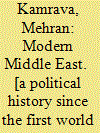

|
|
|
|
|
| Publication |
Berkeley, University of California Press, 2005.
|
| Description |
xiii, 497p.pbk
|
| Standard Number |
0520241509
|
|
|
|
|
|
|
|
|
|
|
|
Copies: C:1/I:0,R:0,Q:0
Circulation
| Accession# | Call# | Current Location | Status | Policy | Location |
| 049433 | 956.04/KAM 049433 | Main | On Shelf | General | |
|
|
|
|
| 8 |
ID:
163228


|
|
|
|
|
| Summary/Abstract |
Oil has seriously impacted the institutional development of the state in the Arabian Peninsula. More specifically, the sudden and unprecedented acquisition of massive oil revenues resulted in the freezing of the state’s formal and informal institutions, at the point at which petrodollars were injected into the state’s coffers. From then on, state leaders were able to deploy the state’s wealth to dictate the pace and direction of institutional change. Over time, any institutional change has been directed towards enhancing regime security, and the pace of change has been calculated and deliberately slow. Any political opening has been dictated by the logic of state power maximization (in relation to society). At the same time, partly to ensure its popular legitimacy and partly through the vision of its leaders, the state has deployed its massive wealth both to foster rapid economic and infrastructural development, and to enhance the living standards of its citizens. In other words, whereas oil may have stunted institutional development –– i.e., an institution’s curse –– it has been an economic blessing.
|
|
|
|
|
|
|
|
|
|
|
|
|
|
|
|
| 9 |
ID:
095486
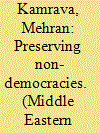

|
|
|
|
|
| Publication |
2010.
|
| Summary/Abstract |
Authoritarian elites often prolong their tenure in office by engaging in wholesale institutional change. Whether inherited or created from scratch, state institutions in non-democracies are meant to solidify elite cohesion and political control, pacify potential opponents, and create coalitions that support the state. Nevertheless, autocrats keep a watchful eye on these institutions, and if they change internally in directions that may seem threatening to state leaders, the institutions are changed or even disbanded. Change to the institutions of the non-democratic state is caused by a combination of deliberate decisions and institutional crafting by state leaders on the one hand, and by institutional layering and changes initiated from within the institutions rhemselves on the other. As the cases of the National Assembly in Kuwait, the Revolutionary Command Council in Egypt, and the Revolutionary Council in Iran demonstrate, when and if state institutions become inefficient or are seen as a threat by authoritarian leaders, then state leaders once again take control in determining their shape and configuration. Non-democracies are often preserved through purposive institutional change.
|
|
|
|
|
|
|
|
|
|
|
|
|
|
|
|
| 10 |
ID:
134427
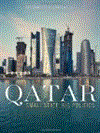

|
|
|
|
|
| Publication |
London, Cornell University Press, 2013.
|
| Description |
x, 222p.Hbk
|
| Contents |
Includes bibliographical references and index
|
| Standard Number |
9780801452093
|
|
|
|
|
|
|
|
|
|
|
|
Copies: C:1/I:0,R:0,Q:0
Circulation
| Accession# | Call# | Current Location | Status | Policy | Location |
| 057927 | 953.63/KAM 057927 | Main | On Shelf | General | |
|
|
|
|
| 11 |
ID:
044027
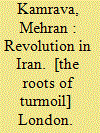

|
|
|
|
|
| Publication |
London, Rontledge and Kegan Paul, 1970.
|
| Description |
x, 174p.hbk
|
| Standard Number |
0415035627
|
|
|
|
|
|
|
|
|
|
|
|
Copies: C:1/I:0,R:0,Q:0
Circulation
| Accession# | Call# | Current Location | Status | Policy | Location |
| 032298 | 955.053/KAM 032298 | Main | On Shelf | General | |
|
|
|
|
| 12 |
ID:
089641
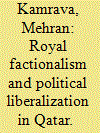

|
|
|
|
|
| Publication |
2009.
|
| Summary/Abstract |
Qatar's much publicized liberalization campaign that began in the mid-1990s was a direct result of efforts by the new Amir, Shaykh Hamad, to compensate for his fragile base of support within the ruling Al Thani family by appealing to a broader base of Qataris and also to the international community. Historically, the Al Thani family had been one of the only centers of potential opposition to the reigning Amir, with merchant families or the religious establishment having been politically neutralized due to a variety of historical and structural reasons. Nevertheless, in relation to both groups the state has pursued a nuanced policy of simultaneous co-option and political incapacitation. Meanwhile, steady rises in oil and gas revenues allowed the state to significantly deepen its capacity in relation to society, and, by doing so, to ensure that groups from within civil society did not rise to positions of prominence. Within the Al Thanis, Shaykh Hamad undertook a number of significant changes, not the least of which was the creation of new institutions and offices that were staffed by his loyal supporters, including some of his sons and daughters. He also streamlined the line of succession to include only his own descendants. With the traditional political disquiet of the Al Thanis thus silenced, at least for now, all talks of liberalization have been dropped and the Qatari state remains fundamentally autocratic.
|
|
|
|
|
|
|
|
|
|
|
|
|
|
|
|
|
|
|
|
|